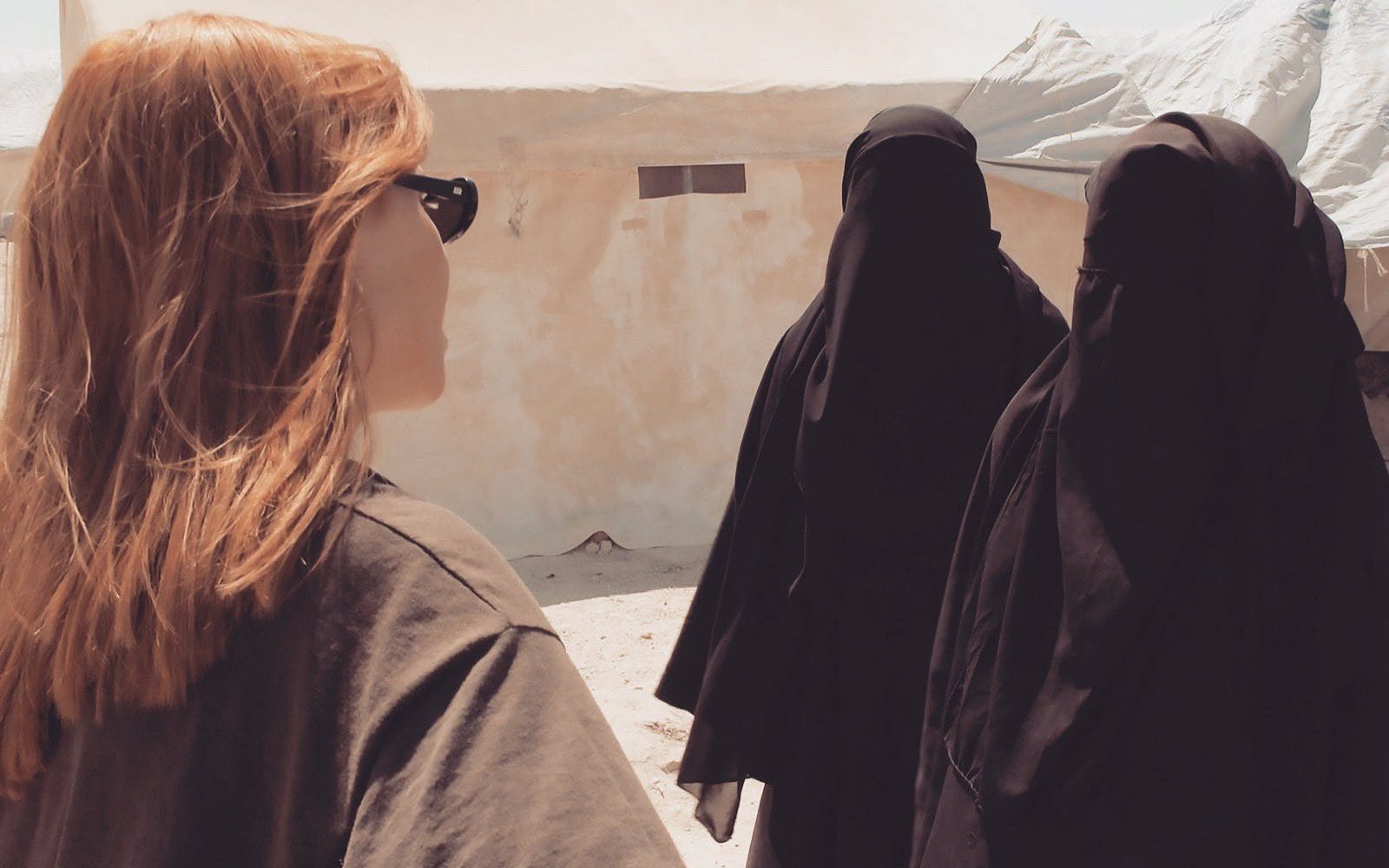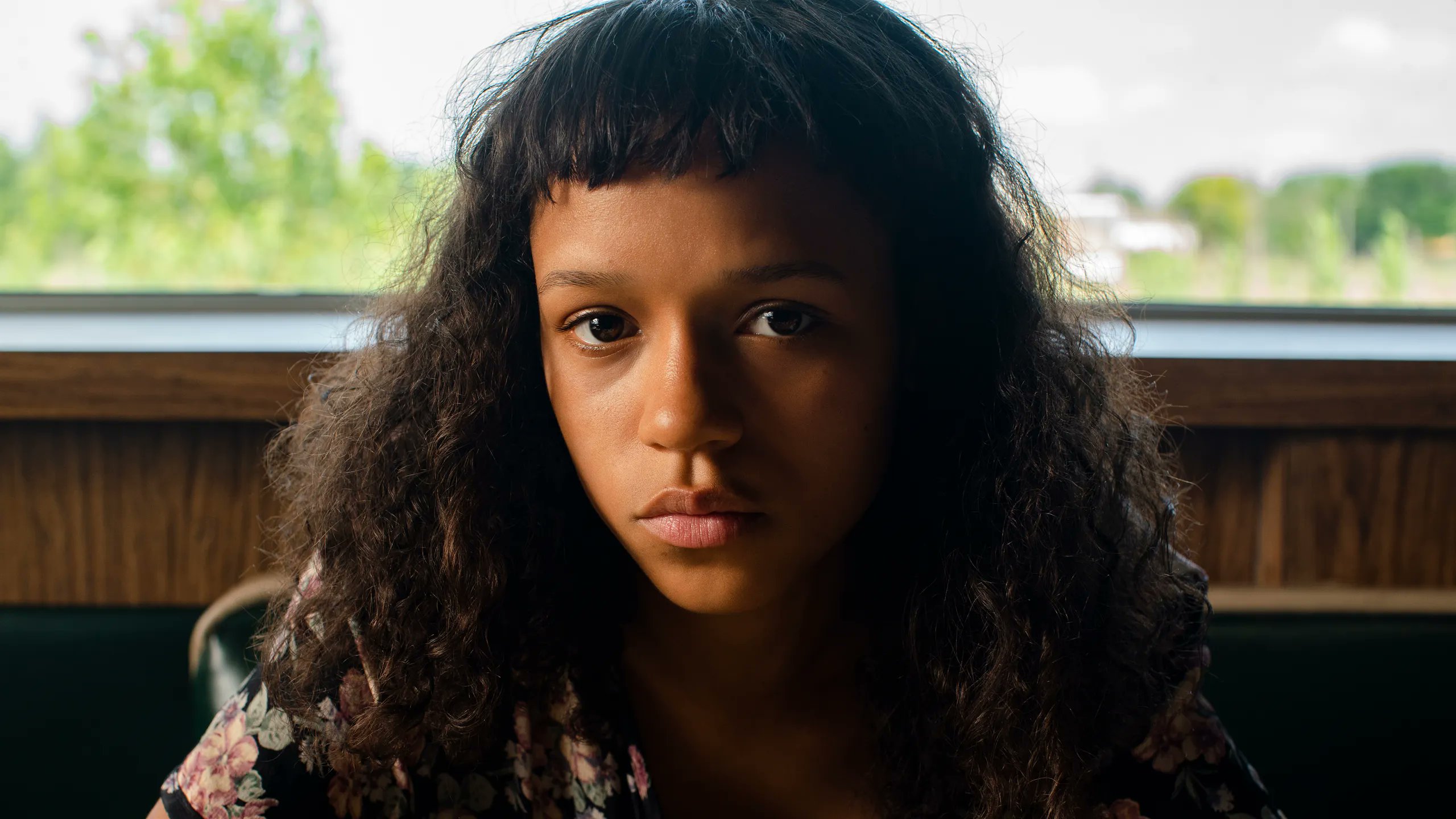
Still courtesy of BBC / Stacey Meets the IS Brides
TW: This article contains mentions of gendered violence and racist abuse
On August 5, the BBC aired their Panorama documentary, Stacey Meets the IS Brides. The haphazard episode received extensive criticism in its wake, and rightly so, after journalist and documentary maker Stacey Dooley ignorantly described a gesture of Muslim prayer as an IS terrorist salute.
As the programme unravelled, Stacey waded her way through Kurdish-controlled territory in northern Syria, propping herself against barbed-wire fences and crouching in front of low-level tents, interviewing some of the women wed to men of the so-called Islamic State.
Her voiceover reads: “It’s hard to know if anyone is telling the truth when saying the wrong thing could cost them their freedom, or even their lives. But the world needs to decide what to do with these women, and with their children.” The camera pans over the women and young children who are wearing niqabs and burqas, before turning back to Stacey as she tilts her head in sympathy.
It’s not unusual to see Western documentary presenters like her presenting “foreign” or “misunderstood” environments to audiences who are couched inside the comfort and warmth of their own homes. In the case of Stacey’s documentary, the lack of Muslim women behind the camera meant that those standing in front of it were distorted and misrepresented through a white Western lens. And while Stacey luxuriates on a £250k BBC retainer, Muslim women are still struggling to get commissions from major broadcasters.
I understand if you’re shaking your head at this point in dismay. But, in order to relieve your disappointment, we’ve spotlighted five bad-ass Muslim women filmmakers, presenters and journalists who are working on some phenomenal projects, so that you’re not confined to watching wishy-washy documentaries by your favourite white saviours.
Basma Khalifa
Basma is a world-renowned fashion stylist, director, filmmaker and writer. After she began vlogging, Basma developed her passion for making documentary-style videos and recently presented a documentary on BBC Three called Inside the Real Saudi Arabia: Why I Had to Leave. The programme follows Basma journeying to her birth country, offering viewers an extremely intimate and thorough assessment of modern-day life in Saudi with respect and integrity. It reached a colossal 1.7 million in viewing figures.
When she’s not styling or creating groundbreaking documentaries, Basma provides cultural commentary for broadcasting platforms like BBC News and ITV News. She continues to write thought-provoking articles that cover a range of subjects, including “How I learned to accept and love my braids” for Stylist Magazine, where she openly discusses why it’s important to continually challenge the global perpetuation of Eurocentric beauty standards. Across her portfolio, Basma interrogates important issues that cover race, identity, faith and gender.
Nijla Mu’min
Nijla is an award-winning writer and filmmaker based in the San Francisco Bay Area whose stories touch on the intersections of blackness, gender and faith. Her debut feature film, Jinn, tells the story of 17-year-old Summer, whose life changes after her mother converts to Islam. In an article for Vice, Nijla wrote why producing a film about “a black girl who dances, kisses, and reads the Qur’an, is my way of fighting erasure of the things I love”.
The gravity of Jinn was recognised by number of film institutions, including SXSW who awarded her with the Special Jury Recognition Award for writing. Following the unprecedented success of the film, Nijla directed an episode of Ava DuVernay’s widely popular OWN series Queen Sugar. Recently, it was also announced that Jinn will be given its first theatrical run in New York this September, translating Nijla’s adept storytelling skills from screen to stage.
Nadiya Hussain
Nadiya is a TV chef, writer and presenter who rose to fame after winning series six of The Great British Bake Off. Her first cookbook Nadiya’s Kitchen, which featured over 100 recipes, was published in 2016 shortly after her victory. Nadiya also fronted a two-part documentary with BBC Two called The Chronicles of Nadiya, where she visited Bangladesh and perfected a series of richly-decorated family recipes, including tender goat biryani and grilled chicken with citrusy shatkora pickle.
Aside from serving us up an array of vibrant and inventive dishes, Nadiya has also used her platform to speak candidly about her mental health. In a BBC programme Nadiya: Anxiety and Me the accomplished presenter discussed her experiences with anxiety and panic attacks. She explained how she’s been working through her struggles since childhood, tweeting: “Thank you for all of the support on here tonight. I watched cautiously and felt nervous throughout but I really hope that now we’re talking about it, we keep talking!”
Fatima Manji
Fatima is a British newsreader and television journalist who studied Politics at the LSE (London School of Economics), before working at the BBC as a trainee. She subsequently joined Channel 4 News, becoming the first hijab-wearing newsreader in Britain. Her work has been critically-acknowledged year after year. She appeared on the finalist shortlist for the Royal Television Society’s Young Journalist of the Year award in 2015 and was ultimately named Media Personality of the Year in 2016 by the Asian Media Awards.
Fatima’s covered a wide range of socio-political affairs, including the EU referendum and the migration crisis in Europe. She also hosted Channel 4’s first ever Alternative Election Debate during the General Election in 2015, which brought together young party leaders as they faced a live audience. She uses her platform to speak about the intersections of racism, sexism and Islamophobia. Through her amazing work she channels her ethos: “there’s no such thing as the voiceless, only the deliberately silenced + the preferably unheard”.
Deeyah Khan
Deeyah is an Emmy award-winning Norweigan British human rights activist, documentary filmmaker and founder of Fuuse media company, which aims to put minority women and children at the forefront of their productions. Her first film, Banaz: A Love Story, premiered in 2012. It closely followed the honour-killing story of a woman named Banaz Mahmod in South London. Deeyah’s documentary revealed the intrinsic racism and sexism that lies within the Metropolitan Police as an institution, giving an extremely nuanced take on a crime that is so often oversimplified in the way that it is reported.
Most recently, Deeyah presented a documentary White Right: Meeting the Enemy, where she trailed neo-Nazis and the Unite the Right rally in Charlottesville. Her film was BAFTA-nominated and won an Emmy award for Best International Current Affairs Documentary in 2018. Deeyah uses her platform to create dialogue between Muslim women from around the world. She founded sister-hood magazine, which is committed to spotlighting the diverse voices of women of Muslim heritage and has now created a network of women from over 37 countries.
There have been countless conversations on “diversity” across industries like film, TV and broadcast journalism. But the process of ticking boxes, filling quotas and publishing statistics has little to no impact on the way that stories produced by ethnic minorities are translated onto the media landscape. It’s important that we think about the way that inclusion manifests so that creatives like Nijlah, Basma, Nadiya, Fatima and Deeyah are the ones sitting behind the camera, having creative control and autonomy over the way that their stories are represented and who they are being written for.









